“A Purr-fect Way to Help Your Cat Live a Longer, Healthier Life!”
Introduction
If your cat is overweight, it is important to help them lose weight and maintain a healthy lifestyle. Being overweight can lead to a variety of health issues, including diabetes, joint pain, and heart disease. Fortunately, there are a few simple steps you can take to help your cat lose weight and stay healthy. This guide will provide you with tips on how to help your cat lose weight and maintain a healthy lifestyle.
The Benefits of a High-Protein, Low-Carb Diet for Cats
A high-protein, low-carb diet is becoming increasingly popular for cats, as it can provide numerous health benefits. This type of diet is based on the natural diet of cats in the wild, which is high in protein and low in carbohydrates. It is important to note that cats are obligate carnivores, meaning they must consume animal-based proteins to meet their nutritional needs.
The primary benefit of a high-protein, low-carb diet for cats is that it helps to maintain a healthy weight. Cats that are overweight or obese are at risk for a variety of health problems, including diabetes, heart disease, and joint problems. A high-protein, low-carb diet helps to reduce the risk of these conditions by providing the necessary nutrients without the excess calories.
In addition to helping cats maintain a healthy weight, a high-protein, low-carb diet can also help to improve their overall health. This type of diet is rich in essential vitamins and minerals, which can help to support a strong immune system and promote healthy skin and coat. It can also help to reduce inflammation, which can help to reduce the risk of certain diseases.
Finally, a high-protein, low-carb diet can help to improve a cat’s digestion. This type of diet is easier for cats to digest, which can help to reduce digestive issues such as vomiting and diarrhea. It can also help to reduce the risk of hairballs, as the high-protein content helps to keep the digestive tract functioning properly.
Overall, a high-protein, low-carb diet can provide numerous health benefits for cats. It is important to consult with a veterinarian before making any changes to a cat’s diet, as some cats may have specific dietary needs. However, for cats that are healthy and not overweight, a high-protein, low-carb diet can be an excellent choice.
How to Measure Your Cat’s Food Intake and Monitor Weight
Measuring and monitoring your cat’s food intake and weight is an important part of ensuring your pet’s health and wellbeing. Here are some tips to help you accurately measure and monitor your cat’s food intake and weight.
1. Use a measuring cup or scale to accurately measure your cat’s food. This will help you ensure that your cat is getting the right amount of food for their size and activity level.
2. Monitor your cat’s weight regularly. This can be done by weighing your cat on a regular basis, or by using a body condition score chart.
3. Monitor your cat’s food intake. This can be done by keeping track of how much food your cat eats each day, or by using a food diary.
4. Make sure your cat is getting the right type of food. Different cats have different nutritional needs, so it’s important to make sure your cat is getting the right type of food for their age, size, and activity level.
5. Talk to your veterinarian. If you have any questions or concerns about your cat’s food intake or weight, it’s always best to talk to your veterinarian. They can provide you with personalized advice and help you create a diet plan that is tailored to your cat’s individual needs.
By following these tips, you can ensure that your cat is getting the right amount of food and staying at a healthy weight.
Tips for Increasing Your Cat’s Exercise and Activity Levels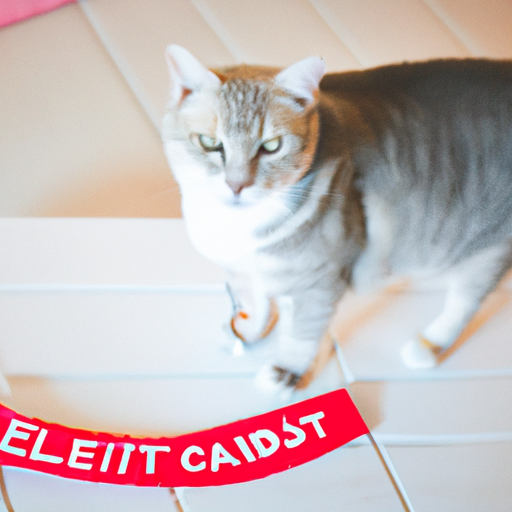
1. Provide your cat with plenty of toys. Cats love to play, so make sure to provide them with a variety of toys to keep them entertained. Try different types of toys, such as interactive toys, scratching posts, and balls.
2. Create an obstacle course. Cats love to explore and climb, so create an obstacle course for them to navigate. Use boxes, tunnels, and other objects to create a fun and stimulating environment for your cat.
3. Take your cat for a walk. If your cat is comfortable with it, take them for a walk on a leash. This will give them the opportunity to explore the outdoors and get some exercise.
4. Play with your cat. Spend time playing with your cat every day. Use toys to engage them in play and encourage them to move around.
5. Provide a window perch. Cats love to watch the world go by, so provide them with a window perch. This will give them a place to observe the outdoors and get some fresh air.
6. Make mealtime more active. Instead of just leaving food out for your cat, make mealtime more active by hiding food around the house for them to find. This will encourage them to move around and explore.
7. Spend time outdoors. If possible, take your cat outdoors for some fresh air and exercise. Make sure to keep them safe and supervised at all times.
By following these tips, you can help increase your cat’s activity levels and keep them healthy and happy.
The Role of Supplements in Helping Your Cat Lose Weight
Weight loss in cats is a serious issue that can have serious health consequences if not addressed. Supplements can be an important part of helping your cat lose weight, but it is important to understand the role they play and how to use them safely and effectively.
Supplements can be used to help your cat lose weight in a number of ways. First, they can provide additional nutrients that may be lacking in your cat’s diet. This can help to ensure that your cat is getting all the nutrients it needs to stay healthy while still losing weight. Second, some supplements can help to increase your cat’s metabolism, which can help to burn more calories and promote weight loss. Finally, some supplements can help to reduce your cat’s appetite, which can help to reduce the amount of food your cat consumes and thus help it to lose weight.
When using supplements to help your cat lose weight, it is important to consult with your veterinarian first. Your veterinarian can help you to determine which supplements are safe and effective for your cat and can provide guidance on the proper dosage and frequency of use. It is also important to ensure that the supplement you choose is specifically designed for cats and is free of any ingredients that could be harmful to your cat.
In addition to supplements, it is important to ensure that your cat is getting adequate exercise and is eating a balanced diet. Exercise can help to increase your cat’s metabolism and burn more calories, while a balanced diet can help to ensure that your cat is getting all the nutrients it needs while still reducing its caloric intake.
In conclusion, supplements can be an important part of helping your cat lose weight, but it is important to understand the role they play and how to use them safely and effectively. It is also important to ensure that your cat is getting adequate exercise and is eating a balanced diet. By following these steps, you can help your cat to achieve a healthy weight and enjoy a long and happy life.
How to Identify and Treat Obesity-Related Health Problems in Cats
Obesity is a serious health problem in cats, and can lead to a variety of health issues. Identifying and treating obesity-related health problems in cats is essential for their long-term health and wellbeing.
The first step in identifying obesity-related health problems in cats is to assess their body condition. A healthy cat should have a visible waist and an abdomen that tucks up when viewed from the side. If your cat is overweight, you may notice that their abdomen hangs down and they have no visible waist. Additionally, you can feel your cat’s ribs and spine. If you can’t feel them, your cat is likely overweight.
Once you have identified that your cat is overweight, it is important to take steps to address the issue. The most effective way to treat obesity-related health problems in cats is to reduce their caloric intake and increase their physical activity. This can be done by feeding your cat a balanced, low-calorie diet and providing them with plenty of opportunities for exercise. Additionally, it is important to monitor your cat’s weight and adjust their diet and exercise routine accordingly.
Obesity-related health problems in cats can include diabetes, joint pain, and heart disease. If your cat is overweight, it is important to take them to the vet for a check-up. Your vet can assess your cat’s health and provide advice on how to best manage their weight. Additionally, your vet may recommend medications or supplements to help manage any health issues that may be related to obesity.
By taking steps to identify and treat obesity-related health problems in cats, you can help ensure their long-term health and wellbeing. With the right diet and exercise plan, you can help your cat reach and maintain a healthy weight.
Q&A
1. What are some tips for helping my cat lose weight?
A. Start by feeding your cat a balanced diet that is low in calories and high in protein. Make sure to measure out the correct portion size for your cat’s weight and age. Increase your cat’s activity level by providing interactive toys and engaging in playtime. Consider switching to a wet food diet, as wet food is generally lower in calories than dry food.
2. How can I tell if my cat is overweight?
A. You can tell if your cat is overweight by feeling their ribs. If you can’t feel the ribs, your cat is likely overweight. You can also look for signs such as a bulging abdomen, difficulty jumping, and difficulty grooming.
3. What kind of exercise should I give my cat?
A. Exercise is important for cats to maintain a healthy weight. You can provide your cat with interactive toys such as laser pointers, feather wands, and balls. You can also engage in playtime with your cat by using a fishing pole toy or a wand toy.
4. What kind of food should I feed my cat?
A. You should feed your cat a balanced diet that is low in calories and high in protein. Make sure to measure out the correct portion size for your cat’s weight and age. Consider switching to a wet food diet, as wet food is generally lower in calories than dry food.
5. How often should I feed my cat?
A. You should feed your cat twice a day, once in the morning and once in the evening. Make sure to measure out the correct portion size for your cat’s weight and age. Avoid leaving food out all day, as this can lead to overeating.
Conclusion
In conclusion, helping your cat lose weight and maintain a healthy lifestyle is an important part of being a responsible pet owner. It is important to monitor your cat’s weight and adjust their diet accordingly. Additionally, providing your cat with plenty of exercise and mental stimulation can help them stay healthy and fit. Finally, regular visits to the vet can help ensure that your cat is healthy and that any potential health issues are addressed quickly.



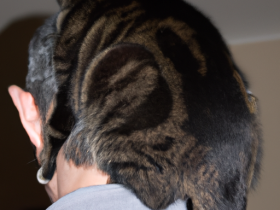
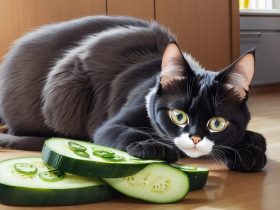
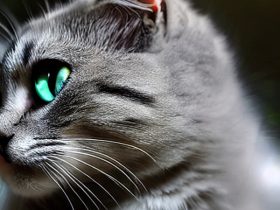
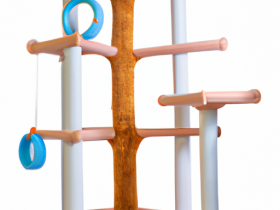
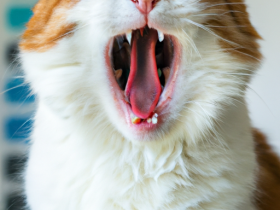
Leave a Reply
View Comments